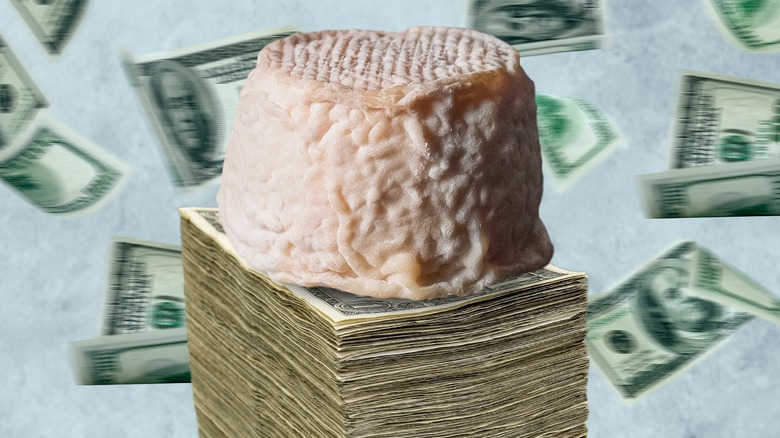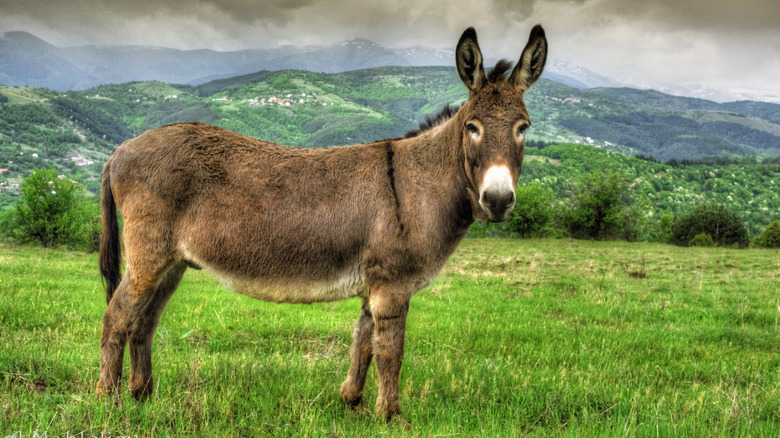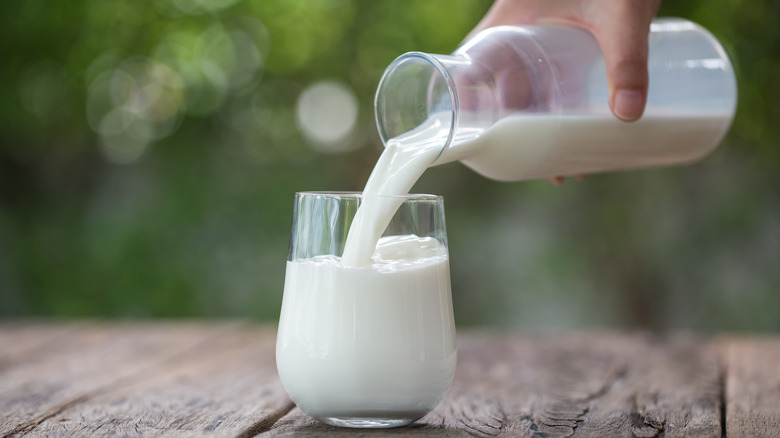The World's Most Expensive Cheese Comes From An Unexpected Animal
The world's most expensive cheese must come from some rarefied French cow, right? A magical creature roaming pastures and lazily munching on the greenest, sweetest, and most nutritious grass and clover? But that's not the story. The world's most expensive cheese comes from a donkey — a Balkan donkey, in particular. The cheese is called pule, and it can cost as much as $600 a pound.
The reason pule is so expensive is because donkey milk is hard to produce and very rare. For example, a cow can produce anywhere from about 22 liters to even up to 60 liters of milk a day at peak lactation. A female donkey, called a jenny, only produces about 1.5-2 liters of milk per day. The Balkan donkeys that are milked for pule live on a nature reserve in Serbia called Zasavica, and according to the BBC, there are about 180 of them. These donkeys are smaller in size than an average donkey and they are domesticated. If you want their milk, you must milk them by hand, three times a day, because no machinery currently exists for the large-scale milking of donkeys.
A man named Slobodan Simić came up with the idea of making pule cheese, and it took some work to get it right. After adding goat milk to the mix, a winning ratio was discovered: Pule would be 60% donkey milk and 40% goat milk. The cheese is then aged for a month. Pule is made in pretty much the same fashion as goat cheese, but there are of course some production secrets.
Is pule cheese worth it?
According to people who have tasted pule, the overwhelming description is that it's a clean tasting cheese. "It had one of the smoothest, supplest textures I have ever enjoyed and the taste reminded me vaguely of almonds," wrote one cheese blogger who made the journey to Zasavica. "Its flavour was sweet, clean and mild, unlike any cheese I had ever tasted," journalist Kristin Vuković described for the BBC. The cheese itself is white in color and crumbly in texture. It's been compared to Manchego, which is a Spanish cheese made from sheep's milk in the La Mancha region.
You can't get pule just anywhere. There are some online specialty stores that sell it, but you have to be super lucky. And if you are lucky enough to find pule at a specialty cheese shop, there's a good chance it's been marked up. Also, don't expect other folks to replicate the process. "No one can make it. Not just at home, but well-known milk experts from many countries have tried to make it, and they have failed," Simić told Business Insider. "That's because of the additional bacteria and substances invented by our expert that succeeded in coagulating the milk ..." If you're dying to taste this cheese, perhaps it's time to plan a journey to Serbia.
Donkey milk has other uses
Aside from being used in pule cheese, donkey milk has a history of being used for both nutritional and beauty purposes. Rumor has it that Cleopatra bathed in donkey milk to keep her skin soft and healthy. The ancient Greek physician, Hippocrates, prescribed donkey milk for its healing properties.
From a cosmetics perspective, donkey milk is packed with vitamins A, B, C, D, and E. Vitamin A, which retinol is derived from, is excellent for skin and is reported to contribute to brighter complexions. Vitamin D has anti-inflammatory properties and is also excellent for skincare. Vitamin C encourages collagen production. There are tons of donkey milk products out there for health and wellness, and even the donkey milk from Zasavica is used in a line of skincare items such as soap and face cream.
Donkey milk is also becoming popular among people with allergies to cow's milk. The protein in donkey milk comes from about equal amounts of casein and whey, while the protein in cow's milk comes from more casein. Because donkey milk has less casein, people with a cow's milk protein allergy are more able to accept donkey milk. So while you probably won't be able to get the world's most expensive cheese, at least you can still reap the positive health benefits of donkey milk.


